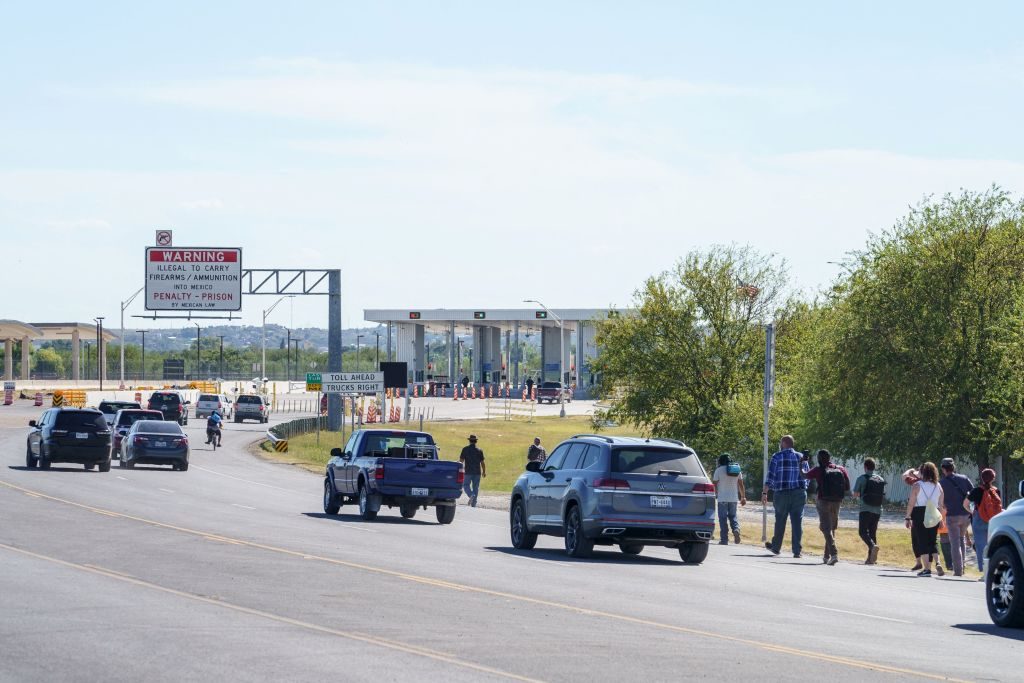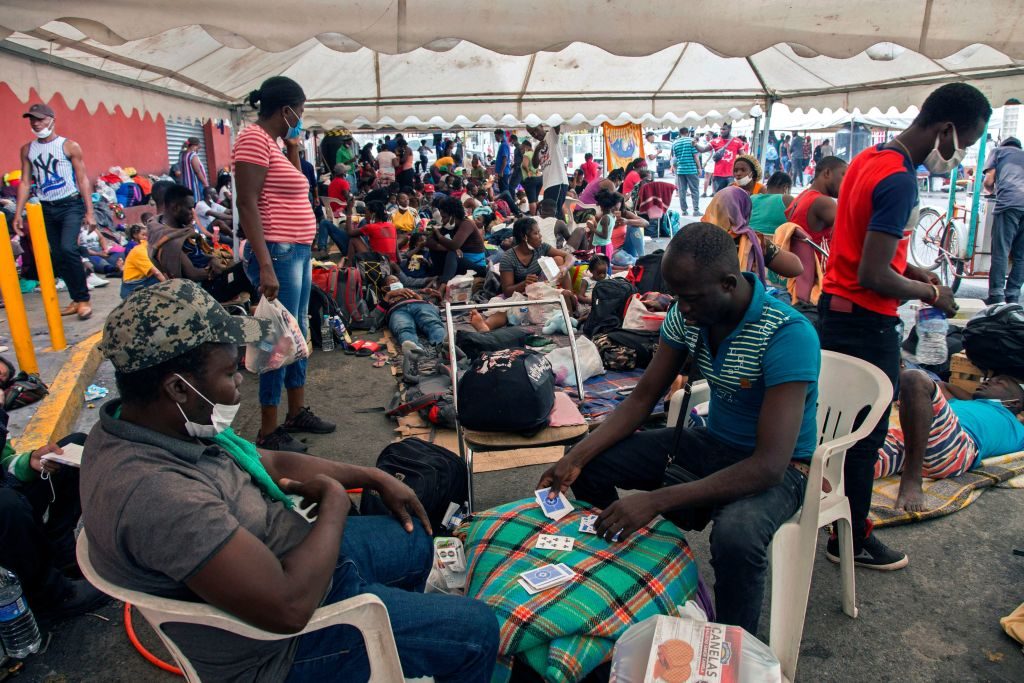A caravan of a few thousand migrants has begun pushing its way north Saturday from southern Mexico, hoping the U.S. and Mexican governments will stand aside while they reach the new lives and jobs in the United States.
The economic migrants departed from the southern town of Tapachula, where many of them have been kept by the Mexican government.
The migrants are fleeing their own failed economies, and are hoping to let them into the United States. Since January, Biden’s deputies have allowed roughly 1 million southern migrants into the United States, even as they also rejected 1 million migrants.
The migrants are appealing to President Joe Biden to let them into the United States:
BREAKING: A large Migrant Caravan has departed Tapachula, Mexico carrying signs w @POTUS name on it @FoxNews #bordercrisis pic.twitter.com/iLCZeSRRPg
— Griff Jenkins (@GriffJenkins) October 23, 2021
The caravan migrants pushed their way past a thin line of Mexican police:
BREAKING: Migrant Caravan in Mexico encounters Mexico’s @INAMI_mx forces… #BorderCrisis pic.twitter.com/8RnFir1j7x
— Griff Jenkins (@GriffJenkins) October 23, 2021
The migrants come from many countries, including the Northern Triangle countries of Honduras, El Salvador, and Guatemala.
The economies of these three countries have been deeply damaged by the U.S. government‘s policy of extraction migration. At least one million young people have been extracted from those countries to serve the U.S. economy as workers, renters, and consumers. The loss of many young people reduces investment in those countries, cuts job growth, and cripples political reform of corrupt governments.
Mexico’s government has the power to block the migrants. But it may prefer to let them get to the United States — just as it let roughly 15,000 Haitian migrants cross the Rio Grande at Del Rio in September.
Currently, Mexican and U.S. government officials are negotiating some sort of migration policy.

The Del Rio Port of Entry has reopened after it was closed for over a week due to an influx of migrants, mostly Haitian, that had gathered under the bridge at the US-Mexico border in Del Rio, Texas on September, 25, 2021. (PAUL RATJE/AFP via Getty Images)
Mexico has leverage in those negotiations, in part, because President Joe Biden’s border officials at the Department of Homeland Security favor migration and are deeply reluctant to physically stop migrants.
This official reluctance to defend Americans’ border and national labor market ensures that the Mexican government can pressure the U.S. government by allowing migrants to hit the U.S. border. This threat can help Mexico’s government extract promises from Biden to provide direct or indirect benefits to Mexico.
One of the claimed leaders of the group told a reporter that many of the migrants would stay to work in Mexico if they got Mexican work permits:
What Mexico should like every country is to make sure they do their share … Money is not going to solve the problem …. [pushing] people from the south border [of Mexico] to the northern border is not the solution. They should give them [work and residency] papers here. They should get an opportunity to work here because a lot of them don’t want to be brought to the U.S. But the Biden administration — with this [Mexican] administration — it’s like holding them [the migrants] like cattle. First they come to this jail [Tapachula], then to go to the northern border. We’re asking them, [the] Mexican government, to give them papers to have a choice because Mexico is a good place to live, to work.
BREAKING: The Leader of the Migrant Caravan Irineo Mujica marching and calling out @POTUS @VP @SecMayorkas #BorderCrisis pic.twitter.com/FxSXYWFbAH
— Griff Jenkins (@GriffJenkins) October 23, 2021
However, many migrants have told U.S. media that they only get Mexican legal documents to help them avoid arrest as they travel up to the U.S. border.
The claimed leader, Irineo Mujica, however, is a long-time activist for a pro-migration group, dubbed Pueblo Sin Fronteras — people without borders. The group is reportedly a spin-off of a Latino group in Chicago. Mujica also has ties to a pro-migration group in Ireland, dubbed Front Line Defenders.
The night before, however, Mujica criticized Biden’s administration with language matching the criticisms from U.S. progressives and corporate lobbyists:
They are just relying on their own polls. If I told you the truth … at least with Donald Trump, we knew what we had. With Biden … he doesn’t seem to have a clue what to do with immigration because he says one thing and does another. Tell me something that Joe Biden has done [for migrants]? He promised immigration reform. He hasn’t done it. He promised he was going to take care of the migrants. He hasn’t done it.
Breaking:Tapachula Mexico leader of caravan Irineo Mujica says the Biden Administration has no clue of what they are doing. @AgueroForTexas @BenBergquam @RealAmVoice @mtgreenee @AliBradleyTV @SaraCarterDC @BiancaforTexas @unite1st pic.twitter.com/QUOGdZBV9T
— Oscar El Blue (@Oscarelblue) October 23, 2021
In reality, Biden’s deputies have rolled back border defenses and allowed roughly 1 million economist migrants to openly or stealthily cross the border from January to the end of September.
Biden has also granted or renewed work permits for at least 1 million migrants living in the United States, including Haitians, Venezuelans, and even residents of Hong Kong.
Biden has also imported roughly 50,000 Afghans, and his deputies are doing little to deter a growing number of economic migrants from Asia and Africa.
Biden is also trying to provide an amnesty and citizenship to all illegal migrants in the United States. If the migrants get across the U.S. border, and if Congress passes the amnesty, they will be able to buy fake documents that claim they are eligible for the amnesty.

Haitian migrants play cards and rest outside a migrant shelter where they await their immigration resolution, in Monterrey, Mexico, on September 26, 2021. The mostly Haitian migrants who had gathered on both sides of the US-Mexico border have provoked a major border crisis for the Biden administration. (JULIO CESAR AGUILAR/AFP via Getty Images)
The huge flow of foreign workers across the line of the 50-state union is welcomed by many employers. The employers claim that a lack of willing American workers is forcing them to raise wages and to treat those workers with more respect.
In contrast, Trump blocked nearly all migration in 2020, and also blocked the planned inflow of one million expected foreign workers from the U.S. economy in 2020 and 2021. His pro-employee policy helped American employees gain wage-raising clout in their own national labor market.
Late in the day, the caravan had swelled to perhaps 5,000 people, and some migrants carried a cross in an appeal to Christian charity.
The caravan continues to grow— Now at 5,000+ as migrants make their way north from Tapachula towards the U.S. border. I’m told it will take them roughly 18 days to get there. #BorderCrisis pic.twitter.com/HGFLnccnyU
— Ali Bradley (@AliBradleyTV) October 23, 2021
The caravan may take 18 days to reach the U.S. border. But the pace will be faster if Mexican drivers provide many riders with short-distance rides, as has happened in prior caravans.
The pace will be slower if Mexican police start picking off smaller groups of migrants, and drive them back to Tapachula or deport them to their home countries.
COMMENTS
Please let us know if you're having issues with commenting.